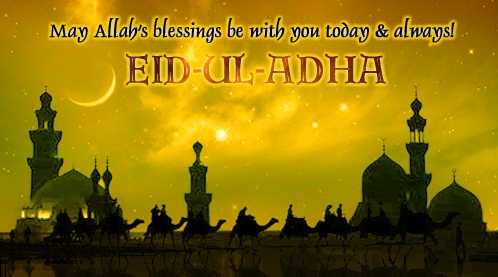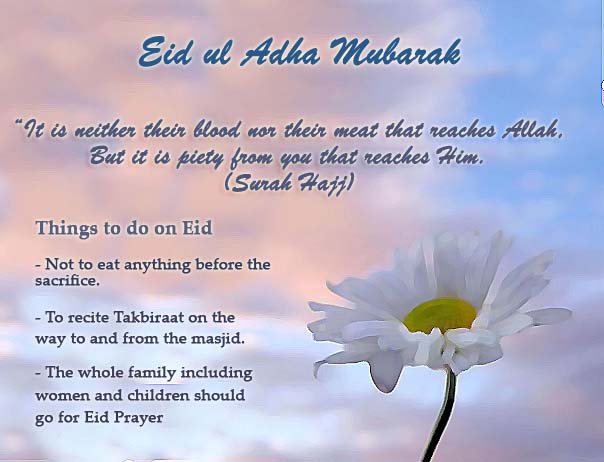Eid UL Adha
Eid UL Adha

Eid al-Adha is the latter of two Eid festivals celebrated by Muslims, whose basis comes from Sura 2 (Al-Baqara) Ayah 196 in the Qur'an.[2]khuṭbah). Like Eid ul-Fitr, Eid al-Adha begins with a Sunnah prayer of two Raka'ah (units) followed by a sermon (
Other names
In Bangladesh and West Bengal it is known as Korbanir Eid কোরবানির ঈদ.
Origin
According to Islamic tradition, approximately four thousand years ago, the valley of Mecca (in what is now Saudi Arabia) was a dry, rocky and uninhabited place. Abraham ('Ibraheem in Arabic) was instructed to bring his Egyptian wife Hajra (Hāǧar) and Ishmael, his only child at the time (Ismā'īl), to Arabia from the land of Canaan by God's command.[citation needed]
As Abraham was preparing for his return journey back to Canaan, Hajra asked him, "Did Allah (God) order you to leave us here? or are you leaving us here to die." Abraham turned around to face his wife. He was so sad that he couldn't say anything. he pointed to the sky showing that God commanded him to do so. Hagar said, "Then Allah will not waste us; you can go". Though Abraham had left a large quantity of food and water with Hajra and Ishmael, the supplies quickly ran out, and within a few days the two began to feel the pangs of hunger and dehydration.
Hajra ran up and down between two hills called Al-Safa and Al-Marwah seven times, in her desperate quest for water. Exhausted, she finally collapsed beside her baby Ishmael and prayed to God for deliverance. Miraculously, a spring of water gushed forth from the earth at the feet of baby Ishmael. Other accounts have the angel Gabriel (Jibrail) striking the earth and causing the spring to flow in abundance. With this secure water supply, known as the Zamzam Well, they were not only able to provide for their own needs, but were also able to trade water with passing nomads for food and supplies.
Years later, Abraham was instructed by God to return from Canaan to build a place of worship adjacent to Hagar's well (the Zamzam Well). Abraham and Ishmael constructed a stone and mortar structure —known as the Kaaba— which was to be the gathering place for all who wished to strengthen their faith in God. As the years passed, Ishmael was blessed with Prophethood (Nubuwwah) and gave the nomads of the desert his message of submission to God. After many centuries, Mecca became a thriving desert city and a major center for trade, thanks to its reliable water source, the well of Zamzam.
One of the main trials of Abraham's life was to face the command of God to devote his dearest possession, his only son. Upon hearing this command, he prepared to submit to God's will. During this preparation, Satan (Shaitan) tempted Abraham and his family by trying to dissuade them from carrying out God's commandment, and Ibrahim drove Satan away by throwing pebbles at him. In commemoration of their rejection of Satan, stones are thrown at symbolic pillars signifying Satan during the Hajj rites.
When Ishmael was about 13 (Ibrahim being 99), Allah (God) decided to test their faith in public. Abraham had a recurring dream, in which God was commanding him to offer his son as a sacrifice – an unimaginable act – sacrificing his son, which God had granted him after many years of deep prayer. Abraham knew that the dreams of the prophets were divinely inspired, and one of the ways in which God communicated with his prophets. When the intent of the dreams became clear to him, Abraham decided to fulfill God's command and offer Ishmael for sacrifice.
When both father and son had shown their perfect obedience to Allah and they had practically demonstrated their willingness to sacrifice their most precious possessions for His sake — Abraham by laying down his son for sacrifice and Ishmael by lying patiently under the knife – Allah called out to them stating that his sincere intentions had been accepted, and that he need not carry out the killing of Ishmael. Instead, Abraham was told to replace his son with a ram to sacrifice instead. Allah also told them that they had passed the test imposed upon them by his willingness to carry out God's command.[10]
This is mentioned in the Qur'an as follows:
"O my Lord! Grant me a righteous (son)!" So We gave him the good news of a boy, possessing forbearance. And when (his son) was old enough to walk and work with him, (Abraham) said: O my dear son, I see in vision that I offer you in sacrifice: Now see what is your view!" (The son) said: "O my father! Do what you are commanded; if Allah wills, you will find me one practising patience and steadfastness!" So when they both submitted and he threw him down upon his forehead, We called out to him saying: O Ibraheem! You have indeed fulfilled the vision; surely thus do We reward those who do good. Most surely this was a manifest trial. And We ransomed him with a momentous sacrifice. And We perpetuated (praise) to him among the later generations. "Peace and salutation to Abraham!" Thus indeed do We reward those who do right. Surely he was one of Our believing servants.[11]
And We gave him the good news of Is-haaq, a prophet from among the righteous.[12]
The Sunnah of Eid al-Adha
In keeping with the tradition of the Prophet Muhammad, Muslims are encouraged to prepare themselves for the occasion of Eid. Below is a list of things Muslims are recommended to do in preparation for the Eid al-Adha festival:
- Make wudu (ablution) and offer Salat al-Fajr (the pre-sunrise prayer).
- Prepare for personal cleanliness - take care of details of clothing, etc.
- Dress up, putting on new or best clothes available.
[edit] Salat al-Eid (Eid prayer)
Salat al-Eid is a Wajib, not a fard kafaya. Fard kafaya meaning that if performed by some, the obligation falls from the rest congregational prayer. Eid prayer must be offered in congregation. It consists of two Raka'ah (units) with seven Takbirs in the first Raka'ah and five Takbirs in the second Raka'ah. For Sunni Muslims, Salat al-Eid differs from the five daily canonical prayers in that no adhan (Call to Prayer) or iqama (call) is pronounced for the two Eid prayers.[13] However, Shi'ite Muslims may begin Salat al-Eid with adhan (Call to Prayer)—with a third repetition of the line "Hayya ala salah" ("Come to prayer")—and iqama (call).[14] The Salaat (prayer) is then followed by the Khutbah, or sermon, by the Imam.
At the conclusion of the prayers and sermon, the Muslims embrace and exchange greetings with one other (Eid Mubarak), give gifts (Eidi) to children, and visit one another. Many Muslims also take this opportunity to invite their non-Muslims friends, neighbours, co-workers and classmates to their Eid festivities to better acquaint them about Islam and Muslim culture.[15]
The Takbir and other rituals
The Takbir is recited from the dawn of the tenth of Dhu al-Hijjah to the thirteenth, and consists of:[16]
-
Allāhu akbar, Allāhu akbar, Allāhu akbar الله أكبر الله أكبر الله أكبر lā ilāha illā Allāh لا إله إلا الله Allāhu akbar, Allāhu akbar الله أكبر الله أكبر wa li-illāhil-hamd ولله الحمد
- Allah is the Greatest, Allah is the Greatest, Allah is the Greatest,
- There is no deity but Allah
- Allah is the Greatest, Allah is the Greatest
- and to Allah goes all praise
- Allah is the Greatest, Allah is the Greatest,
- There is no deity but Allah
- and Allah is the Greatest, Allah is the Greatest
- and to Allah goes all praise, (We) sing the praises of Allah because He has shown us the Right Path. (We) gratefully thank Him because He takes care of us and looks after our interests.
- Allah is the Greatest, Allah is the Greatest, Allah is the Greatest,
- There is no deity but Allah
- Allah is the Greatest, Allah is the Greatest
- and to Allah goes all praise
- Allah is the Greatest, all Praise is due to Him, And Glory to Allah, eventide and in the morning
- There is no god, but Allah the Unique
- He has fulfilled His Promise, and made Victorious His worshipper, and made Mighty His soldiers and defeated the confederates
- There is no deity but Allah
- He alone we worship
- With sincere and exclusive devotion, even though the infidels hate it
- O Allah, have Mercy on our Prophet Muhammad, and on the family of our Prophet Muhammad, and on the Companions of our Prophet Muhammad, and on the Helpers of our Prophet Muhammad, and on the wives of our Prophet Muhammad, and on the offspring of our Prophet Muhammad, and bestow upon them much peace.
Eid Prayer is Wajib, not a fard kafaya.
Traditions and practices
Men, women, and children are expected to dress in their finest clothing to perform Eid prayer (ṣalātu l-`Īdi) in a large congregation is an open waqf field called Eidgah or mosque. Those Muslims who can afford, i.e Malik-e-Nisaab; sacrifice their best domestic animals (usually a cow, but can also be a camel, goat, sheep or ram depending on the region) as a symbol of Abraham's willingness to sacrifice his only son. The sacrificed animals, called Uḍhiyyah (Arabic: أضحية, also known by its Persian term, "al-Qurbāni"), have to meet certain age and quality standards or else the animal is considered an unacceptable sacrifice. This tradition accounts for more than 100 million slaughtering of animals in only 2 days of Eid. In Pakistan alone nearly 10 million animals are slaughtered on Eid days costing over US$ 3 billion.[17]

♫ ♥S Δ n aΔ♫ ♥
CoolcollectionsForYou
http://groups.yahoo.com/group/CoolCollectionsForYou/
====================================================
Group Email Addresses
Post message: CoolCollectionsForYou@yahoogroups.com
Subscribe: CoolCollectionsForYou-subscribe@yahoogroups.com
Unsubscribe: CoolCollectionsForYou-unsubscribe@yahoogroups.com
List owner: CoolCollectionsForYou-owner@yahoogroups.com
R i z w a n-A l a m - Owner
Alam.Rizwan@Yahoo.com
Shamsher Afridi - Sr. Moderator
jimrizin@Yahoo.com
Raj Singh Tomar - Moderator/Designer
rajsinghtomar@aol.com
Nikita Anand - Moderator/Designer
hotnsexytulip@yahoo.com
------------------
DISCLAIMER :
------------------
This message serves informational purposes only and should not be viewed as an irrevocable indenture between anyone. If you have erroneously received this message, please delete it immediately and notify the sender at CoolCollectionsForYou-Owner@yahoogroups.com. The recipient acknowledges that any views expressed in this message are those of the Individual sender and no binding nature of the message shall be implied or assumed unless the sender does so expressly with due authority of The C.C.4.U. Group. reserves the right to repeal, change, amend, modify, add, or withdraw the contents herein without notice or obligation.
---------------------------------------------------
Note:- CoolCollectionsForYou is Not Responsible For Any Claims.
---------------------------------------------------
eid ul adha 2019 in saudi arabia
ReplyDeleteeid al adha observance
eid al adha meaning
eid ul adha 2019 date
eid ul adha 2019 in saudi arabia dat
how is eid al adha celebrated
eid ul adha 2019 in pakistan
happy eid-al-adha